|
If you were born and grew up in the digital age, there's a fair-to-good chance that acronyms like AM and FM will mean nothing to you, at least as they relate to radio broadcasts. Hell, I used to listen to the radio a lot in my younger, pre-digital days and even I had to look up exactly what they stood for and what the difference between them was. AM, I discovered, stands for Amplitude Modulation and was the first method used to broadcast radio signals. Then along came FM, or Frequency Modulation, which offered significantly better sound quality and for many of us was our first experience of stereo broadcasts. In my youth, radios had to be tuned to the station of your choice by manually twiddling an analogue dial, which moved a sliding indicator up and down a string of numbers that mean as little to me now as they did then. On the radio sets I remember you could switch between Medium Wave and Long Wave – both AM frequencies – or, on the better ones, FM. The young me liked the pop music of the day so I tended to listen to Radio 1, which was not on FM. Only the classier stations would be on FM in the UK and the difference in sound quality was instantly apparent. In America FM had a more substantial impact, being the frequency on which the more adventurous stations and DJs made their home, and to the music-loving youth of the day they both had considerable status, at least until corporate interests moved in and started dictating the playlists. Ain't that always the way?
Knowing little of the impact that these DJs had on the listening public of the day in the US, FM is one of those titles I normally wouldn't have covered by choice, but we were sent the disc by Arrow and cover so few of their releases these days that it seemed rude not to give it a look. It's not a film I'd seen before, and a quick check revealed that it's also not a film that many critics of the day had much enthusiasm for. I wasn't sure why, as not wanting to colour my own first viewing with the opinions of others, I stopped reading after the first few lines of the reviews I dug up, but even those short snippets made it clear that the writers in question had not enjoyed it. Hah! What do they know?
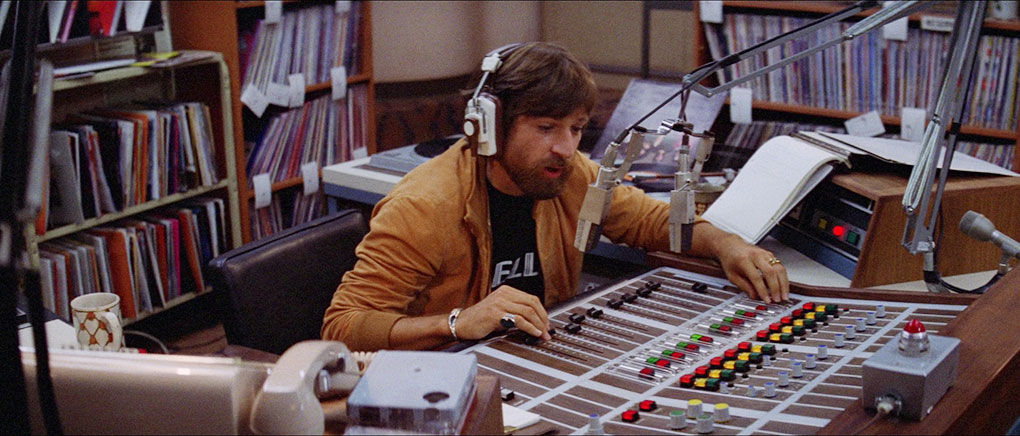
FM was the directorial debut of veteran cinematographer John A. Alonzo (Chinatown, Norma Rae, Blue Thunder, Scarface), and I'm reading nothing into the fact that this proved to be his only theatrical feature as director. It certainly starts well. At the Q-SKY FM radio station in Los Angeles, the night time DJ who calls himself The Prince of Darkness (Blazing Saddles' Cleavon Little) is about to finish his shift and calls station manager and lead DJ Jeff Dugan (Michael Brandon) to remind him that he's due on air as soon as the song he's just put on comes to an end. This presents a small problem for Jeff because he's not long been up and is currently still at home lacing up his shoes. He thus jumps into his sporty Porsche convertible and hurtles across town, catching his morning paper on the fly, giving two motorcycle cops the slip and landing at his mixing desk just as the last song of the night show concludes. On the basis of this sequence alone I felt sure I was going to like this movie.
Q-SKY, we soon discover, is on the cusp of becoming the number one radio station in LA, and at the morning staff meeting Jeff reveals that the corporation that owns the station is sending a new sales manager named Regis Lamar (Tom Tarpey) to, as Jeff puts it, "turn our ratings into dollars." Given that the station has repeatedly resisted full-blown commercialisation, this does not go down well with either Jeff or the other DJs, but because Lamar carries some corporate clout they are obliged to accommodate him when he arrives.
That's the setup in a nutshell – successful independently-minded radio station is threatened by morally suspect commercialisation. There is, of course, a little more to it than that, but only a little. This in itself is not a serious issue, given that filmmakers like Robert Altman had by this point ably demonstrated that you can make successful films in which the characters essentially are the story. This seems to be the model from which FM takes its cue, and as Lamar arrives and makes attempts to ingratiate himself with the station staff, we get to learn a little about each of them. Aside from Jeff and Prince, there are three other DJs, each with their own distinct personalities. First up, there's Mother (Eileen Brennan), whose seductively sultry delivery puts her on a par with Adrienne Barbeau's Stevie Wayne in John Carpenter's The Fog, which this film predates by a couple of years. Then there's Eric Swan (Martin Mull), a blonde-haired and moustachioed love guru who still has one foot firmly stuck in the 60s and who misses no opportunity to have his way with awkwardly compliant women, even in the studio during his broadcasts. Finally there's Doc Holiday (Alex Karras), an older jockey with a country and western vibe whose ratings are steadily falling and who is marked from an early stage as someone who will probably be sacrificed for the station's future prosperity. Working the backroom, meanwhile, is the lab-coated Bobby (Jay Fenichel), who wrestles with the station's wobbly technology and, encouraged by his co-worker girlfriend Shari (Roberta Wallach), creates test idents for the station that he hopes will one day get him a regular spot on the air. Later, when Doc's fortunes start to falter, Jeff's ex-girlfriend and former Q-SKY DJ Laura (Cassie Yates) is persuaded to return and fill in for him.
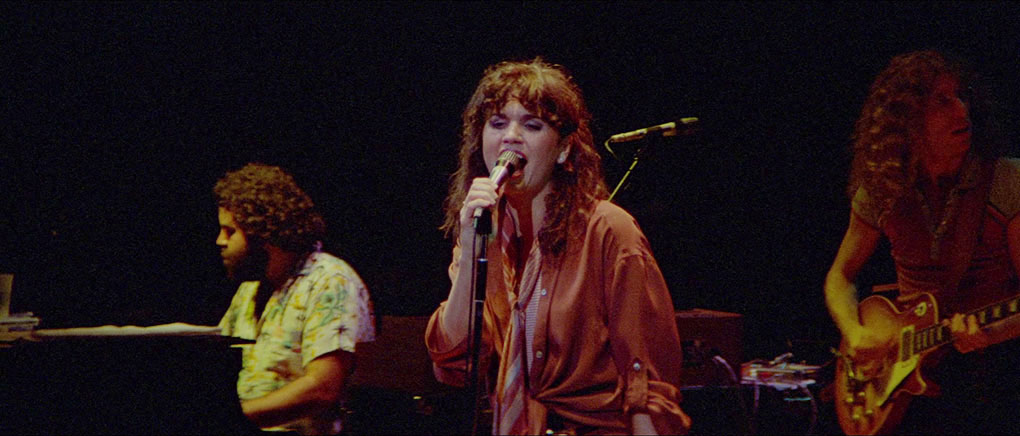
From this, two unrelated and underdeveloped story strands unfold, as Jeff and his team scheme to steal the broadcasting of a Linda Ronstadt concert from under the nose of his rival Michael Carlyle (Terry Jastrow), and Lamar and his boss put pressure on Jeff to accept an advertising deal with Army PR man, Lt. Reach (James Keach, looking uncannily like his brother Stacey). The former provides some minor pleasures in the execution of the plot to keep Carlyle busy while the Q-SKY team hijack his concert, and there is some lively concert footage of Ronstadt and her band. This is the second such musical highlight in the film, the first being similarly vibrant coverage of Jimmy Buffett performing at a club that Jeff takes Lamar to in order to loosen him up a bit. Lamar has a good time but the experience only seems to further enflame his vigour to flood the station with commercials.
The business with Lt. Reach is different story, in no small part because Reach is such a preposterous cartoon of a character, a uniformed military officer with neck-length hair who openly smokes dope that he claims is from the General's personal stash, dances dreamily to army commercials that are dressed up as youth-targeted songs, and cackles like a madman as the drug gets to work. Whatever good the film has done with character creation up to this point is effectively derailed here, as the light-hearted and largely low-key drama makes a jarring dive into overplayed satire. Perhaps coincidentally, this is also where any real development of the principal characters grinds to a halt and they start coasting instead almost solely on what little we learned about them in their introductory scenes. Partly as a result, by the time the film hits its belated climax my interest had waned to the point where I no longer cared much how things worked out for any of them.
So what went wrong here? How is it that a film that engaged me with its opening scenes lost me by its end? It's a question I found myself pondering after the end credits rolled, as on paper FM would seem to right up my political street. Jeff's refusal to run commercials he feels are morally questionable should certainly resonate with someone who from the outset rejected the very idea of taking advertising on his website (that the station does run ads for companies that are probably as shifty and deceptive as the Army recruiters is something we'll write off to a 70s unawareness of the scale of corporate evil to come), and the notion of the staff unifying in strike action in support of Jeff's position gets a big thumbs-up from this lifelong union man. I also found it initially easy to warm to the lead characters and enjoyed the naturalistic edge the actors who play them bring to their performances, but after their economical introductions the film then never gets under their skins of any of them, and with so little made of potentially interesting plot points, it kind of needed to. As a result, the climactic protest to protect Jeff's position, which should have had me rooting for the station staff and punching the air with my fist in cheerful support, prompted no more than a disinterested shrug. It doesn't help that this turn of events comes so late in the story that it's seemingly over before it's begun, which leaves no time for any meaningful discussion of the ethics of the situation in which the station staff find themselves – just a whiff of the sort of debates that the student occupation of the administrative building in Stanley Kramer's R.P.M. prompted would have gone a long way here. Instead it plays out as a string of predictable soundbites and actions, and as a boisterous crowd of supporters gathers outside of the station, the scene's studio lighting gives the whole thing an air of artificiality, making it feel less like a protest and more like the setup for the climactic song of a musical. Even this pales when compared to what immediately follows, a final 'feel-good' twist that's so painfully clichéd and narratively preposterous that it had me shouting angry insults at the screen.
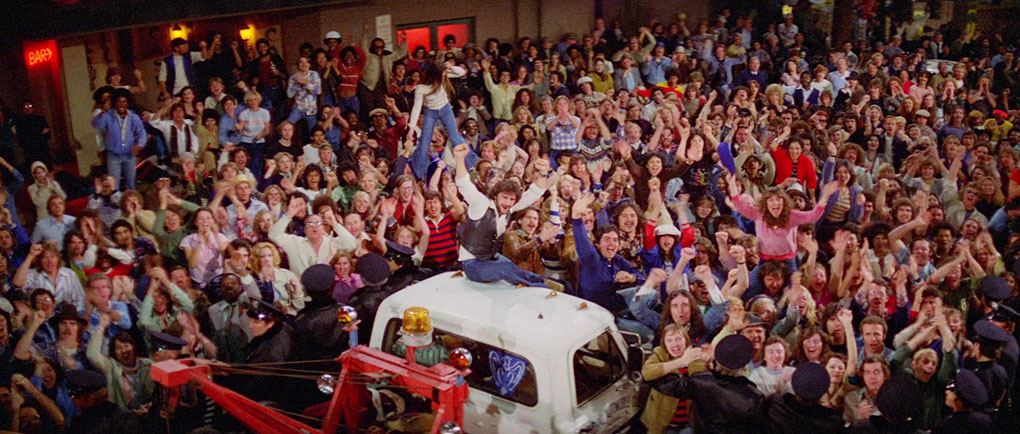
That ending aside, there's nothing offensively unpleasant about FM and a good deal to like, particularly in the performances of the actors playing the station employees, the live concert footage, and a vibrant soundtrack of 70s hits and less well-known songs. A couple of these really work with the visuals to engaging effect, with a montage sequence of preparations for the DJ strike cut to Boz Scaggs' Lido Shuffle being a rare late film highlight. And if you let out a groan at climactic strains of Queen's since overused We Will Rock You, know that this was the first film or TV show on whose soundtrack it featured, though the decision to have the protestors sing along as it is broadcast over external speakers underscored my conviction that they looked ready to burst into song. In the end, it's the soundtrack that carries the film and that has seen it find favour as a nostalgic cult favourite in some quarters in subsequent years, and it probably says something that the soundtrack album was a far bigger hit than the film that spawned it.
Oh, there's something about 35mm film that still leaves digital in the dust for me, something about the warmth of its palette and the texture of the image that even the highest resolution digital camera with the best codec in town just cannot quite replicate, and a strong flavour of that special feel is captured in the very strong 2.35:1 1080p transfer on Arrow's Blu-ray. The colour has that blend of naturalism and richness that takes me back to the glory days of my 1970s cinema visits and while the detail is pleasingly crisp, it also somehow benefits from not being digitally sharp enough to cut your eyeballs. The contrast feels spot-on, nailing the black levels without sucking in detail, even in darker scenes, and that fine film grain we expect to see on 35mm transfers is always visible, but never distractingly so. A few minor dust spots remain but on the whole the image is clean and free of damage. Yeah, this is a very nice transfer.
Two soundtracks (well, technically three – see the extras) are available in the shape of Linear PCM 2.0 stereo and DTS-HD Master Audio 5.1 surround, and as you'd hope for a film in which music plays a prominent part, both are in fine shape. The stereo track is clear, clean of noise and boasts lively reproduction of the various music tracks, peaking in the Jimmy Buffett and Linda Ronstadt concert footage, which has a lovely fullness to it. Everything that goes for the stereo track also goes for DTS surround track, but with some added punch to the bass when the music leads the scene and a slightly richer feel to the sound overall.
Optional English subtitles for the deaf and hearing impaired are on board, as expected.
No Static at All (25:03)
Upbeat leading man Michael Brandon recalls being offered the part at a time when his career could have gone one of two ways, and even suggests that his decision to play Jeff instead of pursue a TV project of his own creation may have contributed to the breakdown of his marriage with Lindsay Wagner of Bionic Woman fame. He goes into some detail about his audition for the part, reveals that the film's early Porsche drive ended in an unseen collision, and tells a long but engaging story about being asked to speak to Linda Ronstadt about getting her permission to shoot footage of her concert for inclusion in the film. Interestingly, he remains unhappy with the final cut of the film – he wanted more story but the producers wanted more music.
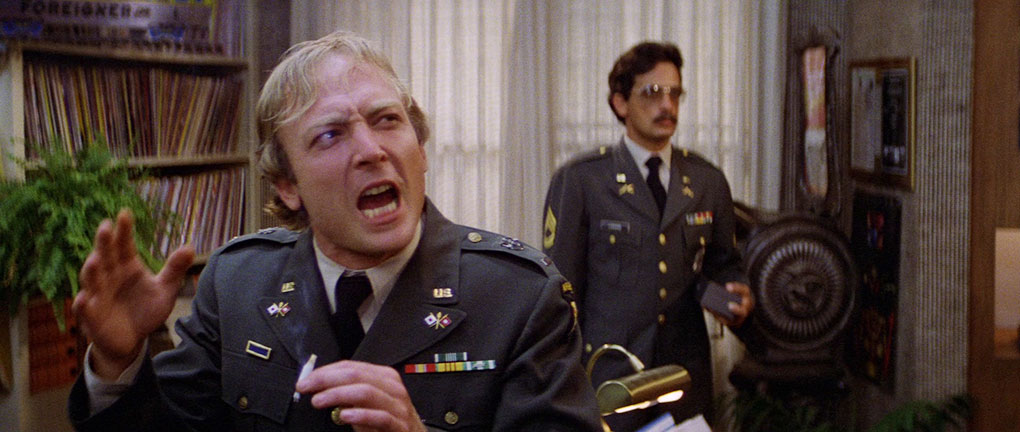
Radio Chaos (23:22)
FM screenwriter Ezra Sacks outlines how he pushed for a job at an FM station run by Marion Elbridge Herrington, aka Captain Mikey, on whom the character of Jeff is partly based, and recalls in some detail the colourful process of trying to convince him that he could do on-air film criticism for the station. He reveals getting the FM screenplay accepted for production was down in part to his friendship with ace editor and by then Universal executive Verna Fields (she cut Jaws, Medium Cool and American Graffiti for heaven's sake), and the Jeff we saw on screen was not as wild as the one he wrote because director John Alonzo assured him that, "the hero of my movie would not run a red light." Sacks believes he would. He has positive things to say about several of the actors, confirms a story I read elsewhere that securing all the music for the film was down to (uncredited) executive producer and former music executive Irving Azoff, and comments on the mixed reception that greeted the film on its release.
The Spirit of Radio (22:58)
Film critic Glenn Kenny provides a most welcome overview of the era of FM radio and delivers an impressively detailed breakdown of the FM soundtrack, with enlightening information on every song used in the film. He notes that the choice of tracks makes it seem as if punk rock never happened and notes that almost all of the chosen artists are "conspicuously white" and primarily American in origin. He also touches on a personal issue he has with the band Foghat, which he moves on from dismissively with a curt, "screw them." I really enjoyed this.
Isolated Music & Effects Track
Given the sheer amount of music in the film, this is one time when I could see the benefit of such a track, which sonically is close to the stereo soundtrack detailed above. It's worth noting, however, that the music and effects play at the volume they were mixed for the film, so while you do get the chance to listen to songs without the distraction of dialogue, many of them play at a reduced volume. The concert footage sounds good, but the Ronstadt material plays without interruption anyway in the film itself, so there's no advantage here.
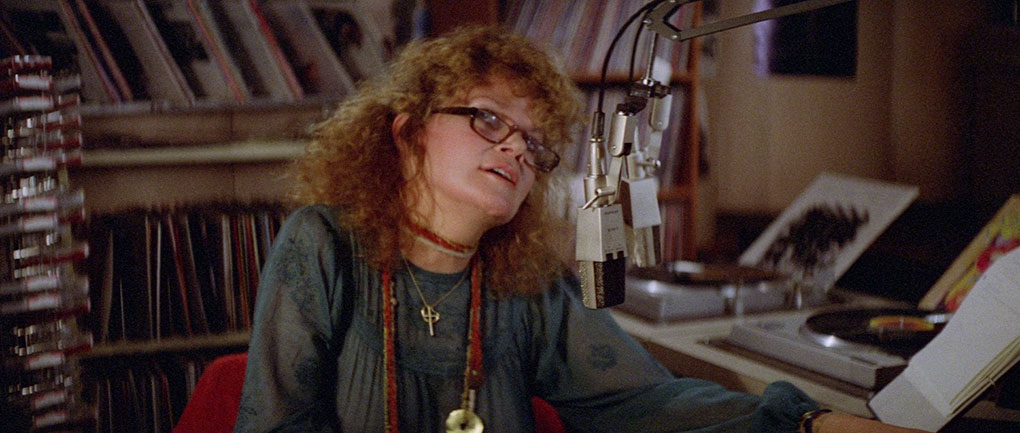
Original Trailer (2:51)
A well edited sell that also pushes the soundtrack album.
Image Galleries
There are three galleries here, each of which can be advanced manually or left to slowly move forward at their own speed. Production Stills contains 59 slides of colour and monochrome photos, including a couple of behind-the-scenes images. Intriguingly, although most look good, none of the colour shots are as crisp and rich as the film itself. Posters, Lobby Cards & Press contains 15 slides of promotional artwork and ads for the film, including one where it was teamed with iffy horror The Manitou, which starred Tony Curtis. Anyone else remember that? Finally, Soundtrack Editions has a generous 44 slides of soundtrack album-related material, including LP covers, photos of records, cassettes and even an 8-track cartridge. Cool.
Included with the first pressing only is an Illustrated Collector's Booklet featuring new writing on the film by writer and critic Paul Corupe, but this was not available for review.
A film that, for me, failed to build on the considerable potential of its engaging first third and by the hurried climax had almost completely lost me. There's still much to like here and the soundtrack alone should prove a bit of a nostalgic treat for anyone whose life played out to the music of the era. I've no issues at all with Arrow's Blu-ray, which boasts a first-class transfer and some engaging extras, with Glenn Kenny's breakdown of the soundtrack being my personal favourite. Safe to say that if you like the film then you'll really like this disc.
|